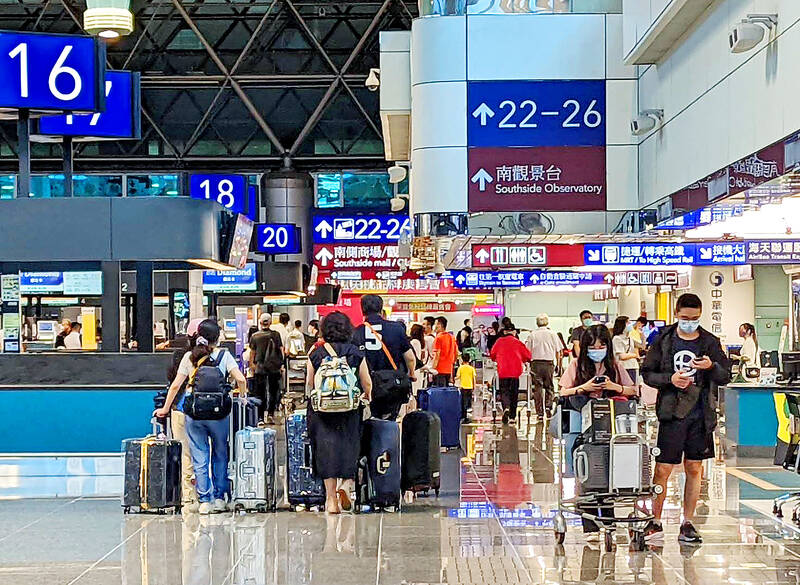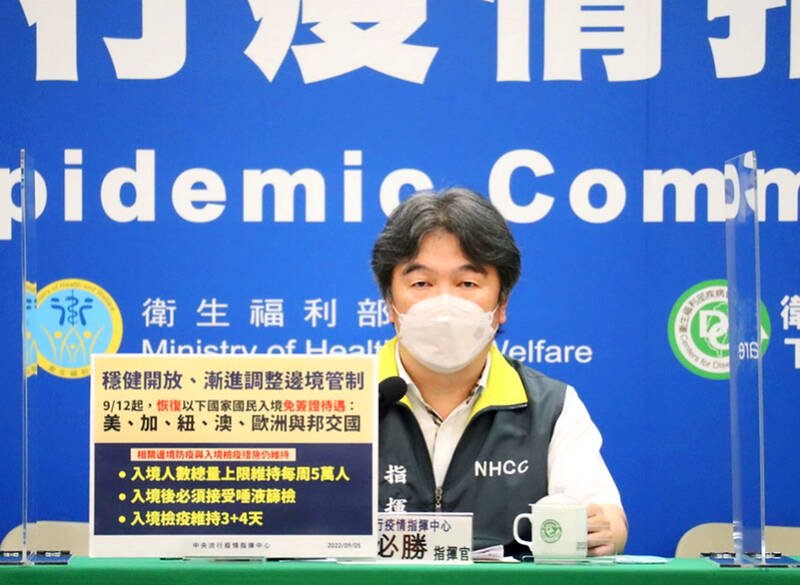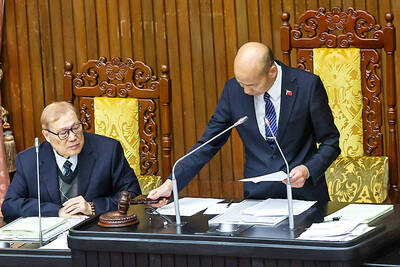Starting on Monday next week, Taiwan will resume offering visa-free entry to a select number of countries, the Central Epidemic Command Center (CECC) announced at its news conference yesterday.
Citizens of Taipei’s 14 diplomatic allies, as well as the US, Canada, New Zealand, Australia and Europe, will be able to enter Taiwan visa-free, but the ban on group tours will remain, said Deputy Minister of Health and Welfare Victor Wang (王必勝), who heads the center.
They will be able to enter Taiwan for business or tourism purposes, take part in exhibitions, engage in international exchanges, visit relatives or attend social events, Bureau of Consular Affairs Director-General Phoebe Yeh (葉非比) said.

Photo courtesy of Taiwan Taoyuan International Airport
After entering Taiwan, travelers must quarantine for three days in a quarantine hotel or at a private residence, followed by four days of “disease self-prevention,” she added.
Europeans and North Americans have complained about the long wait to apply for a visa at Taiwanese embassies and foreign offices, even for Taiwanese with dual citizenship, Yeh said.
That prompted the CECC to open the nation’s borders to those countries and areas while maintaining the inbound traveler cap at 50,000 people per week, she said.

Photo courtesy of the Central Epidemic Command Center
The opening is reciprocal, as these countries have all opened their borders to Taiwanese nationals, Wang said.
The CECC will deliberate on further border openings and whether to lift the cap on inbound travelers, he added.
Earlier yesterday, Premier Su Tseng-chang (蘇貞昌) convened a disease prevention meeting to discuss the COVID-19 situation at home and abroad, border opening and vaccine administration for adults and children.
Su told the meeting about President Tsai Ing-wen (蔡英文) last month asking the Cabinet to draft a border opening schedule and complementary measures to gradually relax disease prevention regulations, Executive Yuan spokesman Lo Ping-cheng (羅秉成) said.
As the global COVID-19 outbreak is gradually brought under control, the Omicron BA.5 subvariant of SARS-CoV-2 has become the dominant strain, accounting for 78 percent of all cases, and needs to be monitored closely, the CECC reported in the meeting.
While domestic cases have risen, 99.55 percent had mild or no symptoms, it added.
Lo quoted Su as asking the CECC to monitor the pandemic and continue to adjust disease prevention measures accordingly.
The positivity rate of inbound travelers from Monday to Saturday last week was 3.58 percent, the CECC said, adding that after the weekly cap on inbound travelers was increased to 50,000 on Aug. 22, 44,900 people entered Taiwan last week.
During the same period, 72 percent of inbound travelers used disease prevention vehicles, while 71.1 percent used quarantine hotels, it said.
Separately, the Taiwan People’s Party (TPP) caucus urged the government to announce a border opening schedule and ask the CECC to purchase next-generation bivalent COVID-19 vaccines, which are effective against the BA.5 subvariant, as soon as possible.
Japan and South Korea have opened their borders despite the spread of the BA.5 subvariant, TPP Legislator Tsai Pi-ru (蔡壁如) said, and the government should propose a clear border opening plan “so that the public would not feel at a loss.”
Additional reporting by Huang Ching-hsuan

DEFENDING DEMOCRACY: Taiwan shares the same values as those that fought in WWII, and nations must unite to halt the expansion of a new authoritarian bloc, Lai said The government yesterday held a commemoration ceremony for Victory in Europe (V-E) Day, joining the rest of the world for the first time to mark the anniversary of the end of World War II in Europe. Taiwan honoring V-E Day signifies “our growing connections with the international community,” President William Lai (賴清德) said at a reception in Taipei on the 80th anniversary of V-E Day. One of the major lessons of World War II is that “authoritarianism and aggression lead only to slaughter, tragedy and greater inequality,” Lai said. Even more importantly, the war also taught people that “those who cherish peace cannot

STEADFAST FRIEND: The bills encourage increased Taiwan-US engagement and address China’s distortion of UN Resolution 2758 to isolate Taiwan internationally The Presidential Office yesterday thanked the US House of Representatives for unanimously passing two Taiwan-related bills highlighting its solid support for Taiwan’s democracy and global participation, and for deepening bilateral relations. One of the bills, the Taiwan Assurance Implementation Act, requires the US Department of State to periodically review its guidelines for engagement with Taiwan, and report to the US Congress on the guidelines and plans to lift self-imposed limitations on US-Taiwan engagement. The other bill is the Taiwan International Solidarity Act, which clarifies that UN Resolution 2758 does not address the issue of the representation of Taiwan or its people in

The Philippines yesterday criticized a “high-risk” maneuver by a Chinese vessel near the disputed Scarborough Shoal (Huangyan Island, 黃岩島) in a rare incident involving warships from the two navies. The Scarborough Shoal — a triangular chain of reefs and rocks in the contested South China Sea — has been a flash point between the countries since China seized it from the Philippines in 2012. Taiwan also claims the shoal. Monday’s encounter took place approximately 11.8 nautical miles (22km) southeast” of the Scarborough Shoal, the Philippine military said, during ongoing US-Philippine military exercises that Beijing has criticized as destabilizing. “The Chinese frigate BN 554 was

LEISURE: The new law adds Confucius’ birthday, the anniversary of the Battle of Guningtou, Constitution Day and Little New Year as national holidays The Legislative Yuan yesterday passed new legislation adding four national holidays and making Workers’ Day a national holiday for all sectors. The Chinese Nationalist Party (KMT) and the Taiwan People’s Party used their combined majority in the legislature to push the jointly proposed draft through its third and final reading. This new law supersedes the existing regulations for the implementation of memorial days and state holidays, which are administered by the Ministry of the Interior. The new law recognizes Confucius’ birthday on Sept. 28, the anniversary of the Battle of Guningtou on Oct. 25, Constitution Day on Dec. 25 and “Little New Year,”